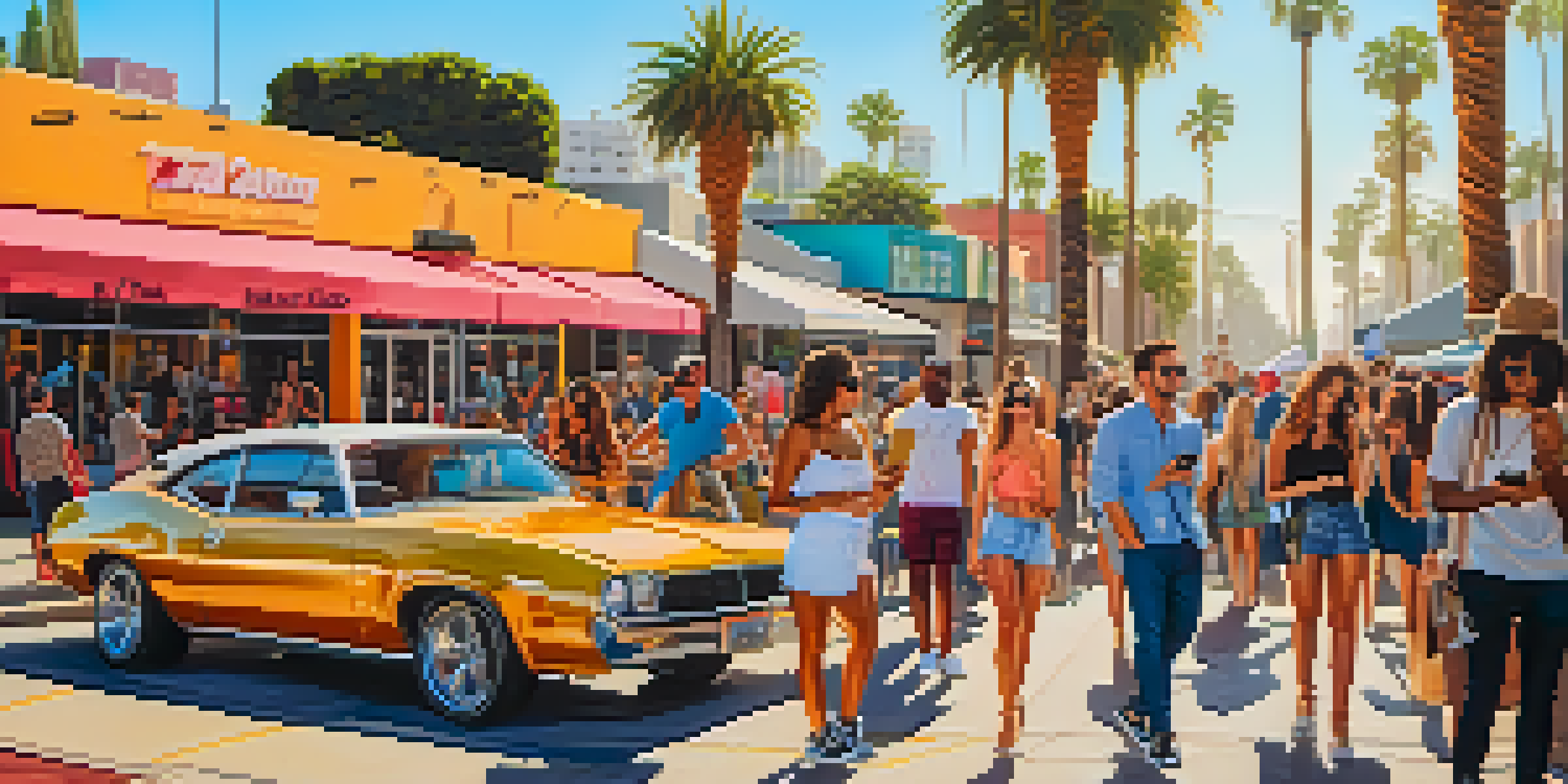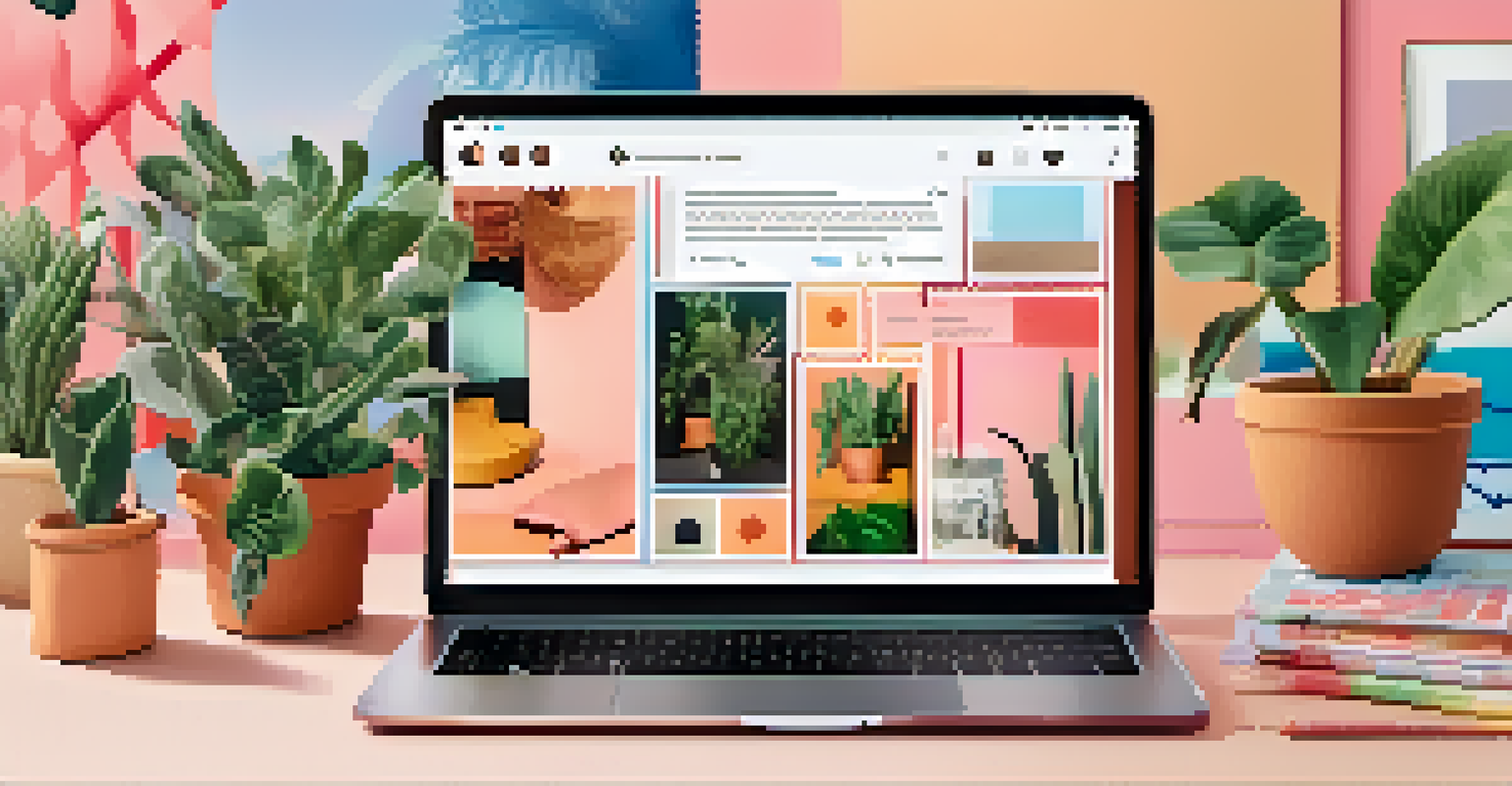The Rise of Influencer Culture in Los Angeles: A Comprehensive Study

Understanding Influencer Culture: What Is It Really?
Influencer culture has become a buzzword, especially in a city like Los Angeles. At its core, it refers to individuals who have built a substantial following on social media platforms and use that influence to promote products, lifestyles, or brands. Think of influencers as modern-day celebrities who connect with their audience in a more personal way, often sharing snippets of their daily lives.
Influencers are the modern-day celebrities, connecting with their audience in a more personal way.
Los Angeles is the epicenter of this phenomenon, attracting influencers from various niches, including fashion, beauty, travel, and fitness. The city's vibrant culture and strong connection to the entertainment industry create a fertile ground for aspiring influencers. With the right combination of charisma and creativity, anyone can potentially become a trendsetter in this digital age.
As influencers continue to rise in popularity, understanding their impact on consumer behavior becomes essential. Their ability to sway purchasing decisions is profound, as many followers trust influencers more than traditional advertisements. This shift marks a significant change in how brands market their products and connect with their target audience.
A Brief History of Influencer Culture in LA
The roots of influencer culture can be traced back to the early days of social media, but it truly blossomed in Los Angeles. In the early 2010s, platforms like Instagram and YouTube started gaining traction, allowing individuals to showcase their talents and lifestyles to a wider audience. This newfound visibility led to the rise of 'YouTubers' and Instagram stars, many of whom found fame overnight.

As these platforms evolved, so did the strategies used by influencers. They began to collaborate with brands, creating sponsored content that felt more organic and relatable than traditional advertisements. This shift not only benefited influencers through monetization but also allowed brands to tap into new customer bases in a more authentic way.
Influencers Shape Consumer Behavior
Influencers have a significant impact on purchasing decisions, often being trusted more than traditional advertisements.
Today, LA is home to numerous influencer agencies and management firms that help nurture and promote talent. This infrastructure supports the growth of influencer culture, making it easier for aspiring creators to navigate the digital landscape and build their brands.
The Role of Social Media Platforms in Influencer Growth
Social media platforms like Instagram, TikTok, and YouTube are the lifelines of influencer culture. They provide the tools and environment necessary for influencers to connect with their audience and showcase their content. Each platform has its unique features that cater to different types of content creators, making it easier for diverse voices to emerge.
The rise of influencer culture signifies a profound shift in how we consume content and make purchasing decisions.
For instance, Instagram thrives on visually captivating content, while TikTok focuses on short, engaging videos. This diversity allows influencers to experiment with various formats, leading to innovative content that keeps their followers engaged. The algorithms of these platforms also play a crucial role, as they often promote content that garners high engagement, giving influencers the opportunity to reach even larger audiences.
Moreover, these platforms have introduced features like shopping tags and affiliate links, which enable influencers to monetize their content directly. This integration further solidifies the relationship between influencers and brands, as it creates a seamless shopping experience for consumers.
The Impact of Influencer Culture on Marketing Strategies
As influencer culture has grown, so has its impact on marketing strategies employed by brands. Companies are increasingly shifting their focus from traditional advertising to influencer partnerships, recognizing the authentic connection influencers have with their audience. This shift not only drives sales but also enhances brand loyalty by fostering a sense of community.
Brands are now investing in influencer marketing campaigns that prioritize long-term relationships over one-off promotions. By collaborating with influencers who align with their values and target audience, companies can create more meaningful and effective marketing strategies. This approach often results in higher engagement rates and conversions, as followers are more likely to trust recommendations from influencers they admire.
LA: Hub of Influencer Culture
Los Angeles serves as the epicenter for influencer culture, attracting diverse creators and fostering their growth.
Furthermore, the rise of micro-influencers—those with smaller but highly engaged followings—has changed the game for brands. These influencers often have a more authentic connection with their audience, resulting in higher trust levels. Brands are leveraging this trend to reach niche markets and connect with consumers on a more personal level.
Challenges Faced by Influencers in Los Angeles
While influencer culture may seem glamorous, many influencers face significant challenges, particularly in a competitive market like Los Angeles. The pressure to constantly create fresh and engaging content can lead to burnout and mental health struggles. Influencers must also navigate the fine line between authenticity and commercialism, as followers can quickly detect inauthenticity.
Additionally, the ever-changing algorithms of social media platforms can make it difficult for influencers to maintain consistent engagement. What worked yesterday may not work today, creating an environment of uncertainty that can be stressful. Influencers often invest significant time and resources into their content, only to face unpredictable outcomes.
Moreover, the saturation of influencers in various niches means that standing out is more challenging than ever. New influencers are emerging daily, and maintaining relevance amidst the constant influx can be daunting. This competitive landscape requires influencers to continuously adapt and evolve, further complicating their journey.
The Future of Influencer Culture in Los Angeles
As influencer culture continues to grow, it's essential to consider what the future holds for this dynamic landscape in Los Angeles. The rise of new technology, such as augmented reality and virtual reality, could revolutionize how influencers create and share content. Imagine being able to step into a virtual world curated by your favorite influencer; this could become a reality sooner than we think.
Additionally, the ongoing conversation around authenticity and transparency will likely shape the future of influencer culture. Followers are becoming more discerning, and influencers who prioritize genuine connections and honest endorsements will continue to thrive. This trend may lead to a shift away from overly polished content towards more raw and relatable storytelling.
Future Trends in Influencer Marketing
The future of influencer culture will likely emphasize authenticity, innovative technology, and deeper brand partnerships.
Finally, as brands recognize the value of influencer partnerships, we can expect to see an increase in investment in this area. This will not only empower influencers to create even more engaging content but also foster a more collaborative relationship between brands and creators. The future looks bright for influencer culture in Los Angeles, and it will be exciting to see how it evolves.
Conclusion: The Enduring Influence of Influencer Culture
The rise of influencer culture in Los Angeles signifies a profound shift in how we consume content and make purchasing decisions. Influencers have transformed the marketing landscape, providing brands with authentic voices that resonate with consumers. Their ability to connect on a personal level has redefined the concept of celebrity, offering a new avenue for connection and engagement.
As we look ahead, the influence of these digital creators will only grow, shaping not just marketing strategies but also broader cultural trends. Their impact can be seen in everything from fashion to lifestyle choices, illustrating the power they hold in our society. The ongoing evolution of influencer culture invites us to reflect on our relationship with social media and the content we consume.

Ultimately, the journey of influencer culture in Los Angeles is just beginning. As influencers continue to adapt and innovate, they will undoubtedly leave an indelible mark on the digital landscape, influencing how we engage with brands and each other in the years to come.